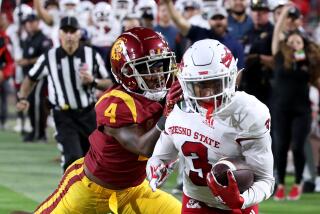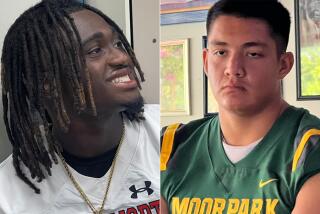To Play in the NFL or to Study at Oxford--Syracuse Tackle May Face the Choice
- Share via
NEW YORK — Amid the seeming decaying morals of college football, a Tim Green occasionally emerges.
Green, a defensive tackle at Syracuse, is headed for a first-round selection in the NFL draft this spring. Or is he?
Later this month, Green will find out if he has been accepted as a Rhodes Scholar. If selected, and the powers at Oxford University in England say he cannot combine his studies with pro football, Green will have a big decision--and the NFL will have a 6-foot-2 and 250-pound question mark.
“I don’t know how you can pass up a Rhodes Scholarship,” he said. “It is a once in a lifetime opportunity.”
Thirty-two Americans earn Rhodes Scholarships each year from a field of thousands of candidates across the country. An applicant must excel in sports and academics to be eligible.
“If he declares (that he will play immediately), he is a first-round pick,” said Dick Steinberg, the Patriots director of player development. “If he announces to the world that he will take time off to go to Oxford, it might affect where he is taken.”
Green is hoping to emulate the route of Pat Haden, the NFL’s last Rhodes Scholar. Oxford allowed Haden to play for the Rams while missing one of the three terms a year.
“It is a lot different for him than for me,” Haden said. “I knew I was going to be a late-round pick--I was picked in the seventh round. I was going to take the Rhodes regardless. But for him, the financial consideration is so different because he can be a number one. Still, I would highly recommend not giving up a chance at a Rhodes.”
It took Haden, who graduated from USC, three years to complete the usual two-year workload at Oxford.
“It was a great growth coming from Southern California athletics my whole life,” Haden said of his Oxford experience. “I guess it makes you feel different to pull off that double. It gave Howard Cosell something else to talk about on Monday nights.”
There is also the case of Bill Bradley, who delayed an NBA career for two years to fulfill his Rhodes Scholarship. Bradley returned to star with the New York Knicks.
“If I get to go or not, it is a great honor to even be a candidate,” said Green, who majors in English literature and has a 3.85 grade-point average. “Right now, I have no real gut feeling. I think it is 50-50.”
Either way, Green insists no college football player should bypass a serious education to reach the NFL.
“You should definitely graduate in four years even with the football,” he said.
Still, he says the system--which has left broken hearts and empty heads--needs adjustment.
“There are two ways to look at it,” he said. “The ideal sense would be all who play are good students and good athletes. But I can’t say that and people of responsibility can’t say that. This means the agenda has to be changed.”
Green has written on the issue for the September Chronicle of Higher Education. He suggested that schools tailor programs for athletes who admit their sole purpose is to become professionals.
“Don’t give them Bachelor of Arts or Bachelor of Science degrees with soft four-year courses that leave them unable to read or write,” Green said. “But like you would not penalize an outstanding medical student for being unable to pass physical education, do not penalize those superior athletes who cannot pass classes.
“Give them pre-professional training, a vocational alternative. Give them something that will make them better adjusted.”
More to Read
Go beyond the scoreboard
Get the latest on L.A.'s teams in the daily Sports Report newsletter.
You may occasionally receive promotional content from the Los Angeles Times.










